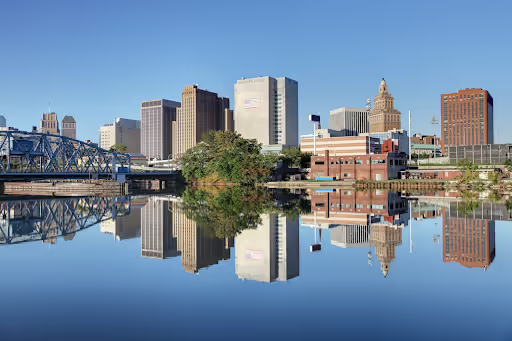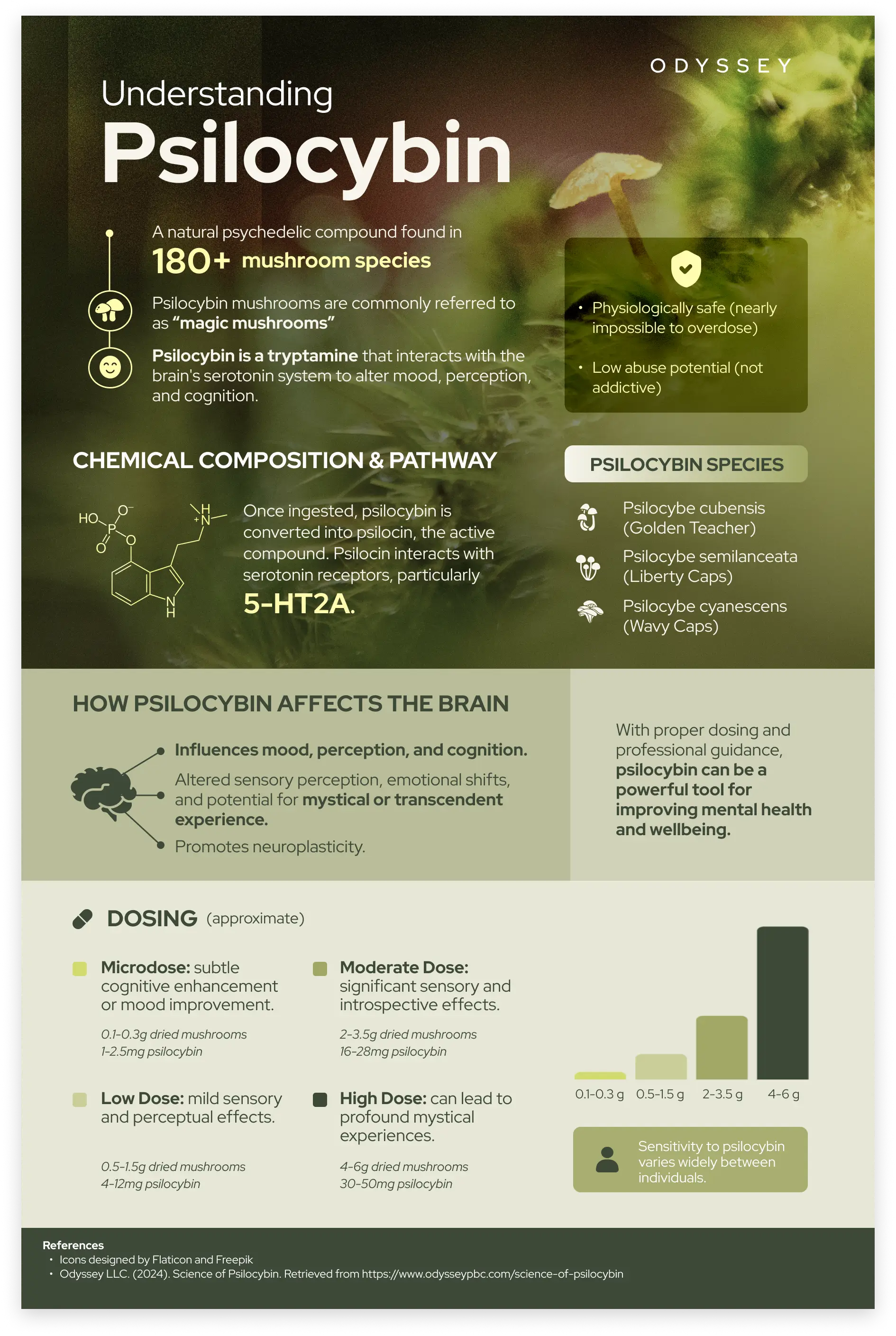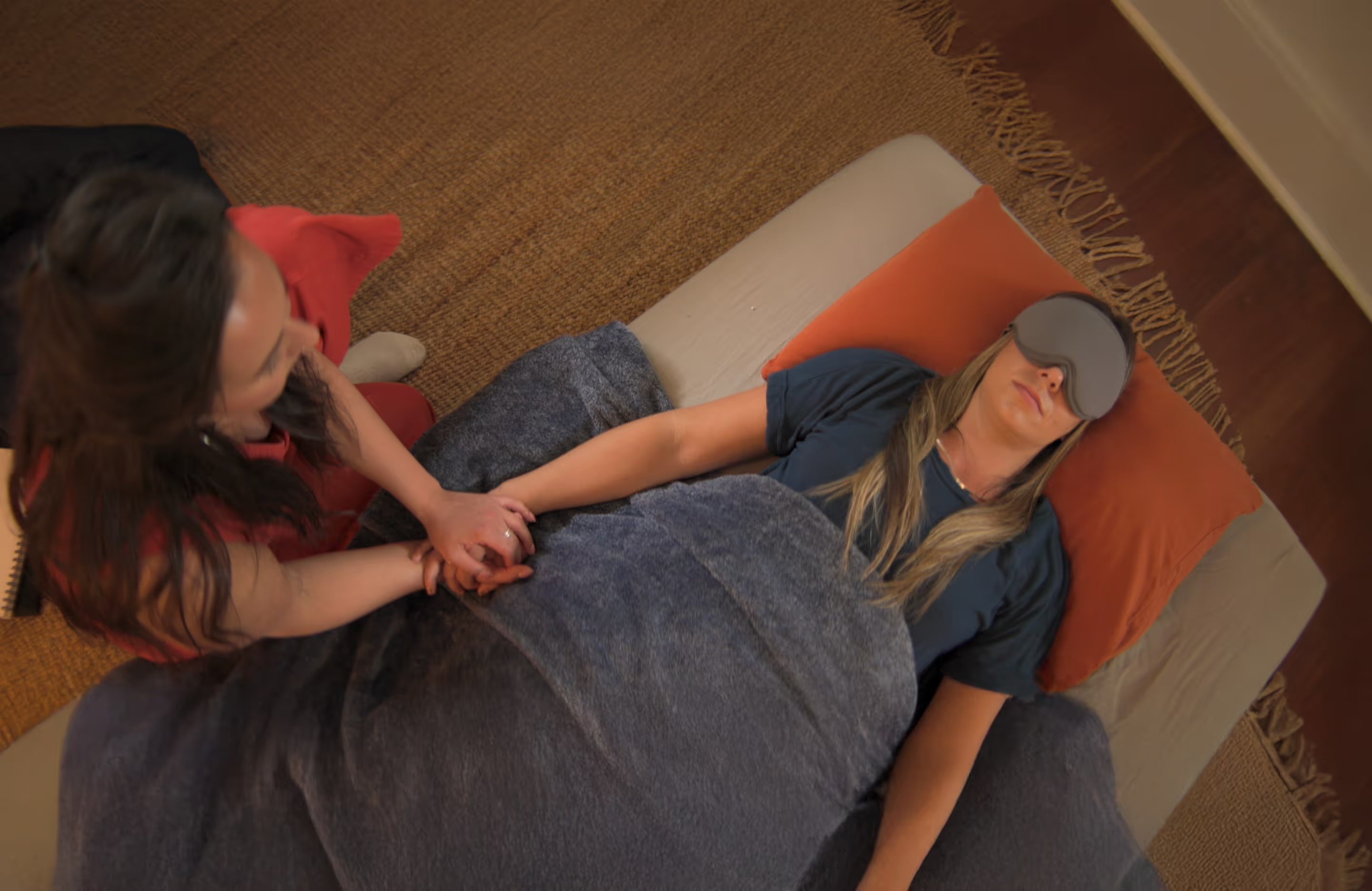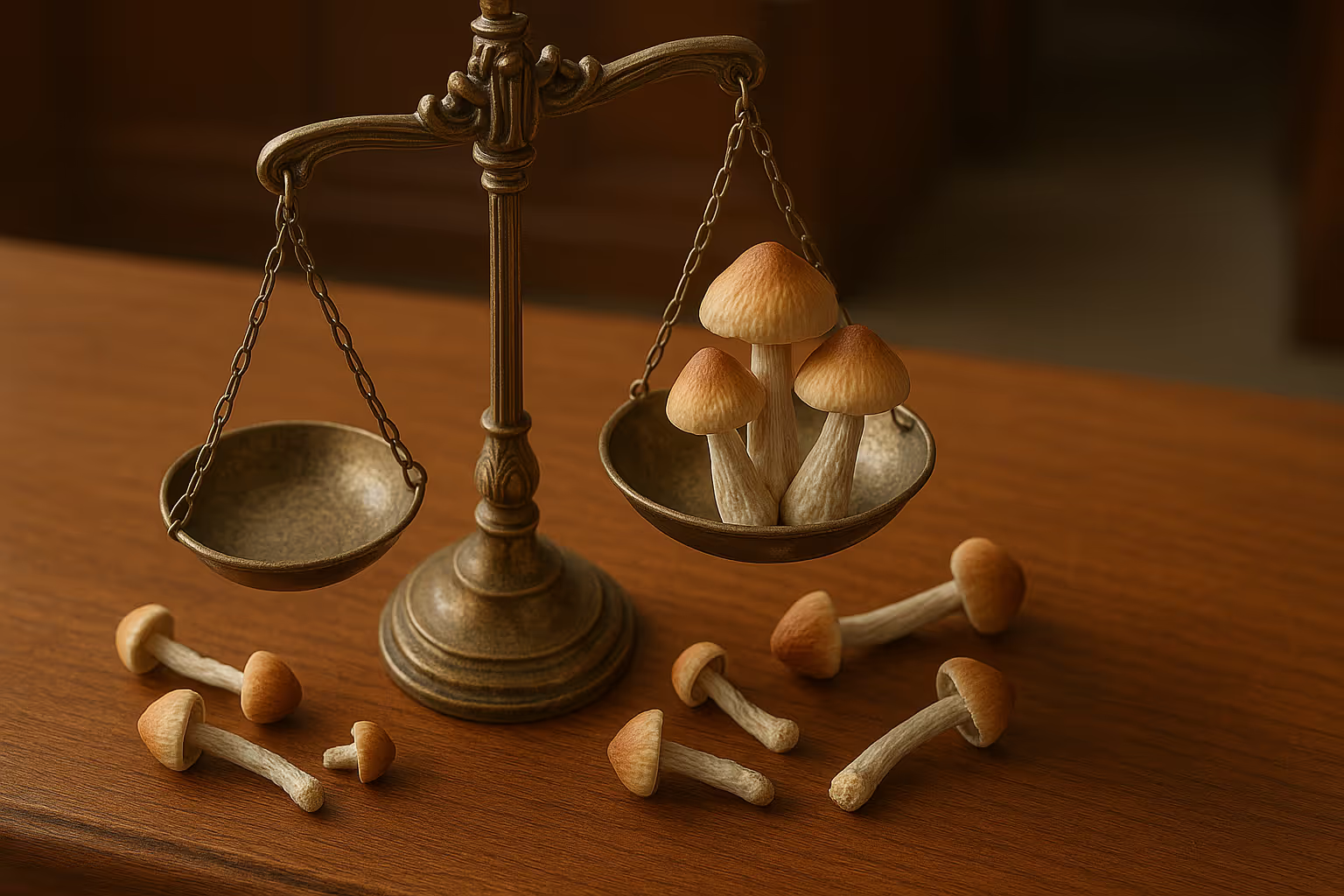Are Mushrooms Legal in New Jersey? The State of Psilocybin in 2025

As psychedelic-assisted therapy continues to gain legitimacy in the medical and mental health communities, psilocybin, the active compound in so-called “magic mushrooms,” has emerged as a focal point in national discussions on drug policy reform. In 2025, New Jersey finds itself at a critical juncture. With pending legislation and a growing body of clinical research supporting therapeutic applications, the state is considering changes on psilocybin. But what is currently legal, and what lies ahead?
As of April 2025, psilocybin remains illegal in New Jersey, classified as a Schedule I substance in spite of proposed legislative changes. However, the legal status of psilocybin in New Jersey remains a complex issue. In this article, we'll explore everything you need to know about psilocybin in New Jersey in 2025, including its legal background, therapeutic benefits, and state policy status. Furthermore, we’ll delve into the latest research and offer insight on accessing psilocybin legally and safely outside the state.
What is Psilocybin?
Psilocybin is a naturally occurring psychedelic compound found in over 200 species of fungi, primarily in the genus Psilocybe. It's the main psychoactive substance in "magic mushrooms," which can cause mind-altering effects similar to other psychedelics like LSD, mescaline, and DMT. When ingested, psilocybin is quickly converted to psilocin in the body, which then acts on serotonin receptors in the brain.
Psilocybin significantly disrupts functional connectivity in the brain, particularly in the default mode network (DMN), a network often associated with introspection and self-perception. This can lead to profound changes in perception and consciousness, and users may experience a distorted sense of space, time, and self. However, psilocin’s potent action on serotonin receptors is also part of the reason for psilocybin’s current classification as a Schedule I controlled substance under New Jersey’s Controlled Dangerous Substances Act, which mirrors federal rulings.
Psilocybin mushrooms have been used in indigenous cultures in Mesoamerica for religious and spiritual purposes for generations. Today, they’re used for recreational as well as therapeutic and medical applications. The effects typically last 6-8 hours, though it varies based on the consumer, method of consumption, and dosing. The effects may include euphoria, visual and emotional shifts, and a spiritual or mystical experience.

Are Mushrooms Legal in New Jersey? Status and Laws
Recent Developments
As of April 2025, the possession and sale of psilocybin remains illegal in New Jersey. However, the state has recently taken steps toward legalizing psilocybin for therapeutic purposes. In January last year, a bill titled “The Psilocybin Behavioral Health Access and Services Act” (S2283) was reintroduced into the state Senate after being pulled back for revisions in late 2023.
This proposed legislation would have removed criminal penalties for psilocybin use by individuals aged 21 and older, while also expunging previous and pending charges related to psilocybin offenses. By October 2024, it was reported from the Senate Budget and Appropriations Committee with amendments and as of April 2025, Bill S2283 has not been enacted, leaving psilocybin illegal despite advancing to a second reading in the Senate by October 2024. In the meantime, it’s crucial to understand: what exactly would this bill entail?
The Psilocybin Behavioral Health Access and Services Act (Bill S2283)
Since its introduction, this 50-page proposal has garnered impressive legislative support statewide. Leading the effort is Senate President Nick Scutari, a key advocate behind the state's recreational marijuana legislation passed in 2021, and Joseph Vitale, another Democrat, from Woodbridge. Their bipartisan co-sponsors include Senators Schepisi, Zwicker, and Cruz-Perez.
Originally, the bill included provisions that would have allowed for limited personal possession and use of psilocybin by adults. However, in June 2024, amendments refocused the bill exclusively on therapeutic access, removing broader decriminalization measures.
As amended, Bill S2283 includes the following provisions:
- Psilocybin Services: Establishes a regulatory framework for the provision of psilocybin services, including preparation, administration, and integration sessions, overseen by licensed facilitators.
- Licensing: Introduces a licensing system for psilocybin product manufacturers, service centers, and facilitators, ensuring regulated access to psilocybin.
- Social Equity Program: Includes a social opportunity program to assist individuals from distressed areas in accessing licenses and support.
- Restrictions: Limits psilocybin service centers from being near schools or in residential areas and prohibits advertising that targets minors.
- Regulation and Safety: Mandates testing and proper label of psilocybin products for public safety. The Department of Health would oversee tracking, manufacturing, and the sale of psilocybin products.
As of April 2025, New Jersey continues to deliberate on Bill S2283. If passed, The Department would have up to 18 months from the bill's enactment to establish the necessary framework for psilocybin services to begin operation in the state. This may entail regulations for manufacturing, testing, sales, licensing, and overall compliance.
Until then, lawmakers and advocates continue to produce and revise proposals for psilocybin reform. Sign up for Odyssey to stay in the loop on future legal, professionally-guided psychedelic experiences in New Jersey.
What Would Regulation Look Like?
If Bill S2283 passes, New Jersey would implement a tightly regulated psilocybin program overseen by the Department of Health. Much like Oregon’s licensed service centers and Colorado’s medicalized treatment framework, New Jersey’s approach would emphasize safety, professional oversight, and therapeutic support.
- The New Jersey Department of Health would oversee the licensing of: psilocybin manufacturing facilities, “service centers” where psilocybin can be purchased, and testing laboratories. These would all exist under strict conditions, such as securing local zoning approvals (e.g. centers cannot be located in residential areas or within 1,000 feet of schools).
- The department would issue worker permits for these facilities. Psilocybin products must be consumed at a licensed center. However, much like Colorado’s flexibility provisions, operators can deliver the product for home use under regulated circumstances.
- Service centers are required to provide a “preparation session” for initial screenings and an “administration session” where a staff member stays with the customer during their psilocybin experience to offer guidance. An optional “integration session” may follow to help the client process their experience.
- Psilocybin manufacturers would be allowed to grow mushrooms or produce synthetic psilocybin. While the bill doesn’t limit production volume, the Health Department may impose caps. Manufacturers would not be allowed to advertise their psilocybin products publicly but could promote psilocybin services during certain specific times, as long as the ads don’t target minors or encourage excessive use.
- Local governments may regulate service centers and manufacturers with “reasonable regulations,” though the bill does not define these limits. Local authorities cannot levy taxes or fees on these operations. Furthermore, employers would only be able to test workers for psilocybin use if they exhibit visible impairment at work.
- The entire system would be overseen by an 18-member Psilocybin Behavioral Health Access and Services Advisory Board comparable to Colorado’s 15-member Natural Medicine Advisory Board.
Read more: Are Psilocybin Mushrooms Legal in Colorado? 2025 Update and The Rise of Psilocybin Therapy in Oregon: A Comprehensive Guide
Accessing Legal Psilocybin in New Jersey
As of April 2025, psilocybin remains illegal in New Jersey. There are currently no legal avenues to possess, use, or distribute psilocybin in the state. While legislative efforts like the Psilocybin Behavioral Health Access and Services Act (Bill S2283) aim to establish a regulated framework, access will not be available unless and until the bill—or similar legislation—is enacted and implemented.
If S2283 passes, legal access could include:
- Psilocybin Service Centers: Adults 21 and older could visit licensed centers where psilocybin would be administered under the supervision of trained facilitators in structured therapeutic sessions.
- Psilocybin Product Manufacturers: Licensed facilities could cultivate psilocybin mushrooms or produce synthetic psilocybin under strict health and safety regulations, including testing, labeling, and quality control.
- Personal Possession: The original version of the bill permitted adults to possess, store, and transport up to 4 grams of psilocybin for personal use. However, the June 2024 amendments shifted the focus exclusively to supervised therapeutic access, removing decriminalization provisions for general personal use. Future iterations of the bill may clarify or revisit this point.
- Home Cultivation: While early drafts suggested the possibility of home cultivation, the amended version of the bill does not explicitly permit individuals to grow psilocybin-producing fungi. This remains an area of legal ambiguity.
Looking Beyond New Jersey
Until legislation like S2283 becomes law and is fully implemented (a process expected to take 12–18 months post-enactment), psilocybin services remain unavailable in New Jersey. In contrast, Oregon and Colorado already offer legal, regulated psilocybin experiences through licensed service centers and advisory boards focused on public health and safety.
Psilocybin: Medical & Therapeutic Applications

Mental Health Conditions
As with much of the United States, mental health issues are receiving increased recognition and concern in New Jersey. In 2023, 27.7% of adults in New Jersey reported symptoms of anxiety and/or depressive disorder. Encouragingly, the state meets 72.7% of the demand for mental health professionals, significantly surpassing the national average of 27.7%.
This momentum may help pave the way for emerging treatments like psilocybin-assisted therapy. After all, psilocybin has shown significant promise in addressing a wide range of mental health conditions, including major depressive disorder, anxiety, PTSD, substance use disorder, obssessive-compulsive disorder (OCD), anorexia, and chronic pain. The U.S. Food and Drug Administration (FDA) recognized psilocybin as a “breakthrough therapy” for treatment-resistant depression in 2018 and again in 2019, accelerating clinical research efforts.
Clinical trials have demonstrated that psilocybin-assisted therapy can effectively reduce depression and anxiety, with effects comparable to or greater than traditional SSRI medications. Remarkably, only 1-2 doses of psilocybin can produce antidepressant effects lasting months, with minimal side effects and immediate impact.
New Jersey has already taken steps to explore its therapeutic potential. In January 2024, Hackensack Meridian Health (HMH), the state’s largest and most comprehensive healthcare network, entered into a research collaboration with Compass Pathways, a biotechnology company pioneering psilocybin-based treatments.
Their partnership aims to develop an optimal delivery model for Compass’s investigational COMP360 psilocybin therapy, if approved by the FDA. As part of the agreement, HMH and Compass will study how COMP360, administered with psychological support, could be implemented in real-world clinical settings for conditions like treatment-resistant depression.
Potential Risks and Benefits
The benefits of psilocybin therapy go beyond simply alleviating symptoms. Studies suggest that psilocybin may promote neuroplasticity and even stimulate neurogenesis in certain areas of the brain. Additionally, psilocybin may have anti-inflammatory properties, potentially making it a promising treatment for neurological conditions like stroke or neurodegenerative diseases.
One of the standout features of psilocybin therapy is its potential for long-term effects. Research indicates that a single dose of psilocybin can provide benefits lasting up to a year, offering a compelling alternative to traditional antidepressants that must be taken daily.
While generally regarded as physiologically safe, psilocybin does come with potential risks, particularly for those with underlying health conditions. Risks include interactions with certain prescription medications, and the potential worsening of psychiatric disorders like schizophrenia or bipolar disorder. As such, it is not recommended for those with certain psychiatric histories. Comprehensive screening, attention to mental health history, and a strong support network are crucial for minimizing harm.
New Jersey’s Senate Bill S2283 reflects these concerns by requiring that psilocybin services be administered by licensed facilitators. This emphasis on professional training and support underscores the state’s commitment to safe, responsible therapeutic use. As research continues, strict adherence to clinical protocols and ethical frameworks will be essential in ensuring that psilocybin’s potential is realized safely and equitably.
Read: The Safety of Psilocybin Therapy
Conclusion: A Precipice and Turning Point in New Jersey
Undoubtedly, New Jersey stands at a pivotal moment in the national conversation on psychedelic reform. With the advancement of Senate Bill 2283—the Psilocybin Behavioral Health Access and Services Act—the Garden State is moving closer to legalizing regulated psilocybin use for mental health and wellness. The bill, most recently amended and approved by the Senate Budget and Appropriations Committee in October 2024, marks growing recognition of psilocybin's potential.
As of 2024, nearly 1.39 million adults in New Jersey experience mental health challenges, with a rising number seeking alternative therapies. Clinical studies from institutions like Johns Hopkins and NYU continue to demonstrate psilocybin’s efficacy in reducing treatment-resistant depression and end-of-life anxiety. If passed, New Jersey would join states like Oregon and Colorado in establishing a legal framework for therapeutic use—potentially launching pilot programs by late 2025 or early 2026.
However, as of April 2025, psilocybin remains a Schedule I substance under both state and federal law, pending full legislative approval and regulatory action. This highlights the importance of public education and cautious policy development. Lawmakers must ensure that access is paired with professional guidance, standardized dosages, and screening protocols to minimize risks.
Looking ahead, the future of psilocybin in New Jersey will depend on two key factors: continued legislative momentum and public support. With bipartisan backing and increasing awareness of the mental health crisis, the state is positioned to become a regional leader in psychedelic-assisted therapy. Residents and healthcare providers alike should monitor legislative updates, such as upcoming Senate floor votes, and prepare for a possible paradigm shift in behavioral health treatment.
In the meantime, individuals interested in psilocybin therapy should remain cautious of unregulated or illicit use. The coming year will be pivotal in determining whether psilocybin becomes a legitimate, accessible option for mental health care in New Jersey and beyond.
FAQs – Mushrooms in New Jersey
Are mushrooms legal in New Jersey?
As of April 2025, “magic mushrooms” are not legal in New Jersey, though Bill S2283 could change this if passed. The bill aims to regulate therapeutic use for therapeutic purposes, especially in treating mental health conditions.
What is the Psilocybin Behavioral Health Access and Services Act?
The Psilocybin Behavioral Health Access and Services Act is a proposed bill in New Jersey that seeks to establish a legal, regulated framework for the possession and use of psilocybin. If passed, it would allow New Jersey residents over the age of 21 to use psilocybin under specific conditions and would expunge certain past convictions related to magic mushrooms.
What is the legal limit of psilocybin in New Jersey?
If passed, S2283 would allow possession of up to 4 grams for therapeutic use by those 21 and older.
What are the penalties for possession of psilocybin in New Jersey?
As of April 2025, psilocybin is illegal in New Jersey. However, in 2021, New Jersey reduced the penalties for possessing small amounts of psilocybin. Possessing less than 10 grams of psilocybin is now a disorderly persons offense, carrying a penalty of up to six months in jail and a fine of up to $1,000.
What are magic mushrooms?
Magic mushrooms, also known as psilocybin mushrooms, are naturally occurring fungi that contain the psychoactive compound psilocybin. When ingested, psilocybin is converted into psilocin, which affects the brain's serotonin receptors, leading to altered perceptions, mood changes, and hallucinogenic experiences.
What mental health conditions can psilocybin help treat?
Research suggests that psilocybin may be effective in treating a variety of mental health conditions, including treatment-resistant depression, anxiety, PTSD, and addiction. Clinical studies show that psilocybin, when used in controlled environments, can provide long-lasting relief from symptoms.
Key Citations
- 2025 News Release | New Jersey State Police. (n.d.). https://www.nj.gov/njsp/news/2025/20250226.shtml
- Adlin, B. (2021, February 5). New Jersey governor signs psilocybin bill to immediately reduce penalties for possession. Marijuana Moment. https://www.marijuanamoment.net/new-jersey-governor-signs-psilocybin-bill-to-immediately-red
- Dorbian, I. (2024, February 13). If New Jersey legalizes mushrooms, East Coast could follow, says Weed lawyer. Forbes. https://www.forbes.com/sites/irisdorbian/2024/02/13/if-nj-legalizes-mushrooms-east-coast-could-follow-says-weed-lawyer/
- Fallon, S. (2024, January 16). NJ looks to make magic mushrooms legal for recreational use and to treat mental health. North Jersey Media Group. https://www.northjersey.com/story/news/health/2024/01/16/nj-looks-to-make-magic-mushrooms-legal-psychedelic-recreational-mental-health-depression-psilocybin/72189421007/
- Is possession of mushrooms a felony in New Jersey? (2025, January 23). Lustberg Law. https://www.lustberglaw.com/blog/is-possession-of-mushrooms-a-felony-in-new-jersey/
- Kelly, J. (2025, April 16). New Jersey Senate Committee Advances Psilocybin Behavioral Health Access and Services Act. McCarter & English, LLP. https://www.mccarter.com/insights/new-jersey-senate-committee-advances-psilocybin-behavioral-health-access-and-services-act/
- New Jersey. (2019). New Jersey Controlled Dangerous Substances Law. In New Jersey Controlled Dangerous Substances Law. https://www.njconsumeraffairs.gov/statutes/new-jersey-controlled-dangerous-substances-act.pdf
- Walsh, J. (2021, February 4). New Jersey becomes latest state to loosen penalties for magic mushrooms. Forbes. https://www.forbes.com/sites/joewalsh/2021/02/04/new-jersey-becomes-latest-state-to-loosen-penalties-for-magic-mushrooms/
- Wikipedia contributors. (2025, April 8). Psilocybin decriminalization in the United States. Wikipedia. https://en.wikipedia.org/wiki/Psilocybin_decriminalization_in_the_United_States

.svg)









.svg)